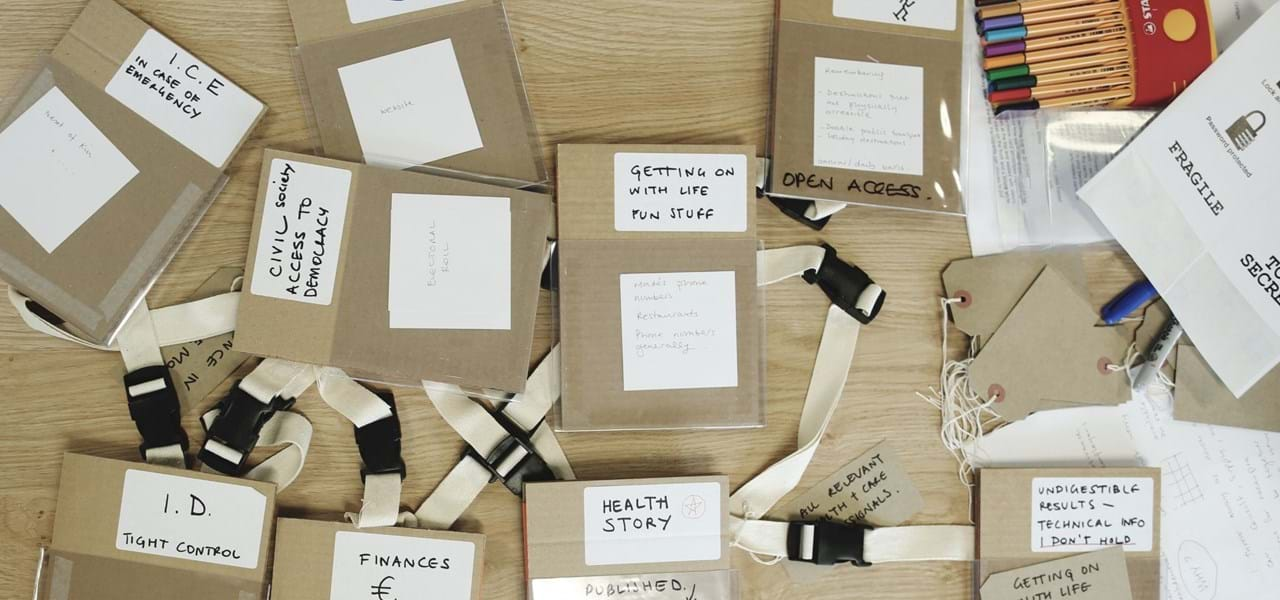Backpack
Person-owned Data Store
Person-owned Data Store
What if all of your personal records, including relevant health and care records, were held in one place that you control?
It was suggested that this personal data store, which we have called a ‘Backpack’, could make it easier to access health & care and support services that are centred around the wishes and needs of the person.
Design researchers from the DHI Design Team worked together with a community interest company, Mydex CIC, and a health professional, Dr Jamie Hogg, NHS Grampian, to explore and develop the Backpack idea with people living with Multiple Sclerosis (MS) and with health and social care staff. People living with MS were identified as highly knowledgeable co-design participants, due to the complex and progressive nature of the condition, requiring many different interactions with public services.
The aims of the project were to explore how people living with MS would like to manage their personal information in order to improve the experience of accessing services, and understand the potential of the Backpack to support health and care professionals to deliver more integrated and person-centred care.

Both people living with MS and health and care professionals were very positive about the concept of the Backpack, and saw how it could be used to improve communication and make services more person-centred.
We learned some general qualities people living with MS value from the people and services that support them. Services should be orientated around their personal goals and needs, and should seek to offer convenience to make everyday life easier. People valued services and places that felt safe and welcoming; and professionals who showed understanding about the challenges of living with MS, and were knowledgeable about the people and services that could help.
Participants would value the ability to access their own health information, with equitable access to the information their health professional holds about them. They also told us that health professionals working in different services or health boards do not always share health information, and suggested that the Backpack would allow them to ensure their health professionals had access to all the relevant information. While they might not want to see lots of medical jargon, they would want to see their high level test results and have the ability to access the detail if required, e.g. to share with a health professional in a different region.
I would be empowered to answer the Doctor’s questions.
Four design concepts were created in response to key insights or challenges.
The health and care system is very complex and it is often challenging to find the person or service that can help.
The Backpack should map the care interactions around the person, providing high-level information to make visible the complex network of professionals supporting the person. This would allow the person, their family and their health and care professionals to see the care that is currently in place, providing contact details and a short summary of the support they are providing. This could be shown as a circle of care or on a timeline.
People living with MS described having to recount their ‘story’ every time they connect with a professional or service, which is emotionally draining and time-consuming.
A 'Health Story' would provide a space within the Backpack for the person to share their story in their own words, using video or written narrative, supported by key dates and facts.
People living with MS described the challenge and emotional cost of navigating complex services to find the right information, people and services. Eligibility criteria and forms seem to be deliberately confusing, deficit-based and require significant energy to complete, which is already in short supply for people living with MS.
The Backpack could gradually fill up with information as the person completes forms and could automatically draw in data from existing sources. The Backpack could intelligently compare data against eligibility criteria, highlighting any appropriate services they may be entitled to access. Information could be verified through the Backpack (e.g. this person is on the MS Scottish Register) to automatically prove eligibility for services (e.g. Blue Badge for parking).
In Case of Emergency and power of attorney rules can be set up in advance to allow the person to transfer ownership of the Backpack and give access to their nominated person.
The MS nurse manages a very large case load of patients and does not receive information when there has been a change in their situation (e.g. an admission to hospital) or the outcome of a referral to another service.
With permission from the Backpack owner, the system would notify the nurse of any changes in their condition or circumstances recorded by the person or their health and care professionals. These patients would be shown at the top of the list to enable the nurse to better manage their caseload prioritising people who may need their support. The nurse would be able to send out emails to all their patients via the Backpack.
The DHI is further exploring the 'Person-Owned Data Store' concept by building and developing prototypes, and demonstrations of new concepts for care enabled by person-owned data, in our Demonstration and Simulation Environment (DSE).